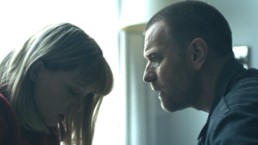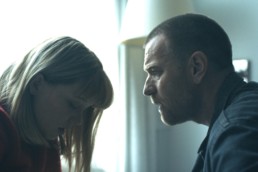‘Zoe’ Review: The Meaning of Love, Explored
This is a custom heading element.
Drake Doremus has done it again.
The independent film director takes the familiar theme of love in modern relationships and adds an exciting new sci-fi element to his latest romantic drama, Zoe. Starring Ewan McGregor as an entrepreneur computer scientist and Léa Seydoux as his research assistant, Zoe is a beautiful and heartbreaking look at the complexities of love and the lengths one is willing to go to hold onto it.
Set in an undisclosed time in the future, Cole (McGregor) is at the forefront of revolutionizing romantic relationships. He has developed technology that determines the compatibility and likelihood of long-term success for couples looking to take that next step in their relationship. Each person is put through an intense question and answer session, with the results being run through Cole’s computer system and then compared to those of their significant other’s. In addition to the computer system, Cole has also been working on creating an ideal physical partner for singletons unlucky in love. “Synthetics,” as they’re called, are programmed to be completely compatible with, and never betray, their partner– qualities that humans struggle with.
While working closely with Cole on this new development, Zoe (Seydoux) becomes increasingly overwhelmed with romantic feelings for him. Although she knows she shouldn’t, Zoe asks if she can personally undergo the Q&A which ends up revealing intimate memories and vulnerabilities. When no one is looking, she runs a compatibility test with Cole with shocking results that reflect a 0.00% chance success rate. Dumbfounded, Zoe can’t help but be honest with Cole about her discovery, and his explanation as to why their relationship could never work out, despite their mutual attraction, leaves Zoe questioning her entire existence.
This sentiment, while universal and fundamentally positive, turns out to have deeper implications than Zoe could have ever imagined, and is the crux of the film’s emotional despair.
Doremus keeps to his signature 50 shades of blue color palette to create a moody and fresh vibe, similar to 2017’s Newness. Partnering up with composer Dan Romer and music supervisor Chris Douridas, the score and music add another powerful element by giving the film its dark, dreamy tone. Songs from indie artists like Beach House are electrically hypnotic and the perfect companion to the visuals on screen.
The performances from McGregor and Seydoux are equally raw and vulnerable (and the irony of McGregor playing a man who strives to create the perfect companion who will ‘never leave his partner’ is not lost on me). Supporting actors Theo James, Rashida Jones, Matthew Gray Gubler, and even Christina Aguilera add further star power to the romantic sci-fi. Drake Doremus definitely knows a thing or two about how to portray an intangible thing like love as either the heaviest burden or the lightest, most effervescent feeling.
“What do you want your partner to see in you?” asks Cole in the very first line of the film. “I want them to see me for who I really am,” answers Zoe. This sentiment, while universal and fundamentally positive, turns out to have deeper implications than Zoe could have ever imagined, and is the crux of the film’s emotional despair. This philosophical questioning of love and authenticity is what makes Zoe so unforgettable among the sea of other festival films. As of this review, Zoe had been acquired by Amazon Prime for a summer release.
This review originally ran on April 26, 2018, during the Tribeca Film Festival.
‘Zoe’ is rated R for some sexual material and drug content. 104 minutes.
Morgan Rojas
Certified fresh. For disclosure purposes, Morgan currently runs PR at PRETTYBIRD and Ventureland.


